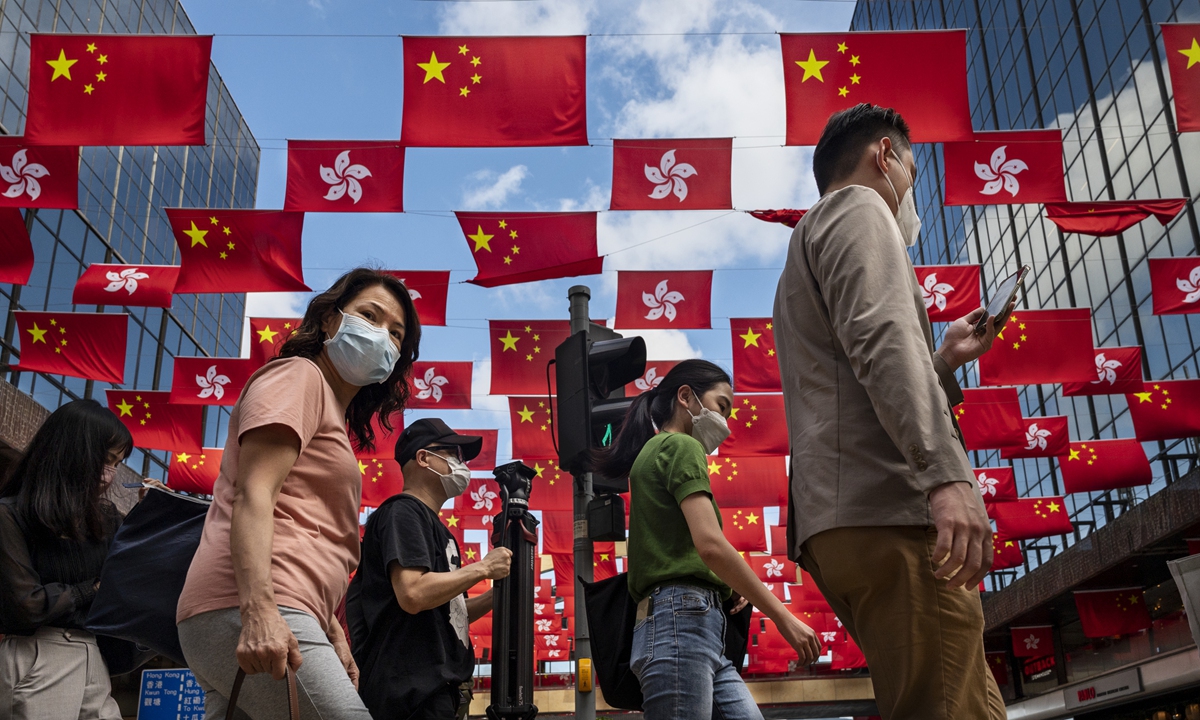
Photo: IC
Gregory May, the newly named US Consul General for Hong Kong and Macau, arrived in Hong Kong on Friday. It can be seen as a signal for Washington to choose such a "China hand" for this post - trying to eliminate at least some of the misunderstandings between China and the US on certain fundamental issues by sending a diplomat who has dealt with China and understands what China stands for.
It should be said that one of the considerations of the US appointment is at least in part to "avoid adding further tension between Washington and officials in Hong Kong and Beijing," as reported by the South China Morning Post. Although a consul general is not a high-level official with significant decision-making authority in the US hierarchy, it's necessary for Hong Kong, which has a unique status in East Asia, to be sent such a "career diplomat with years of experience in the Greater China region."
It has been more than two years since the implementation in Hong Kong of the National Security Law (NSL) for Hong Kong. Since that time, many of the Hong Kong secessionists and rioters have pleaded guilty. The last US consul general to Hong Kong Hanscom Smith arrived in the city three years ago with hidden tasks by the US government, with one of them being "supporting the opposition forces in Hong Kong for illegal assemblies and undermining national security," revealed by Kennedy Wong Ying-ho, a Hong Kong-based member of the National Committee of the Chinese People's Political Consultative Conference, according to a Global Times report. The three years when he was in office were also the period when China-US relations continued to decline and external forces intervened in Hong Kong affairs most rampantly.
The rhetoric and actions of Smith went too far, including openly supporting violent protesters in the "black terror," and using Cold War mind-sets to create ideological and cultural confrontations. Li Xiaobing, an expert on Hong Kong, Macao and Taiwan affairs from Nankai University, noted that in the contest between China and the US over Hong Kong at that time, Smith was a manipulator whose words against the implementation of the NSL for Hong Kong continued till the day he left office. The years of his tenure were a dark page in Hong Kong's history since its return to the motherland, and Smith needs to take responsibility for this.
As a witness of Hong Kong's shift from chaos to governance, Smith saw the implementation of the NSL for Hong Kong. Prior to this, as there was not much inhibition in US actions in Hong Kong, Washington regarded the region as its sphere of influence in which its economic and political forces could act recklessly in this "free port." But things often develop in the opposite direction when they become extreme. After violent protests against the "extradition bill," the Chinese central government not only enacted the NSL for Hong Kong, but also improved the region's electoral system.
This served to provide Hong Kong with an umbrella for safeguarding national security and made up for previous loopholes. In the future, the US will have no opportunity to fish in troubled waters as it used to do in Hong Kong. As long as US foreign affairs personnel commits illegal acts, they must be held responsible for their behavior.
In 2019, through various overt and covert actions to disrupt Hong Kong, the US briefly achieved some of its goals to some extent, that is, Washington's influence had largely exceeded that of London in Hong Kong. But now the special administrative region has adopted the NSL for HongKong - a stability anchor. Especially after the 25th anniversary of Hong Kong's return to the motherland, and the new chief executive and key officials of the new HKSAR government took office, China has not only thwarted the US attempts to destabilize Hong Kong, but Hong Kong now has no soil for the US and the UK to train hatchet men to undermine the city's stability at will. Li said that even if the new US consul general is given the same task by the US his government as Smith had been, he will no longer be able to act recklessly and cooperate with internal and external forces like his predecessor, thus posing a serious challenge to the practice of One Country, Two Systems.
Hong Kong is still a very important strategic direction for the US in its "competition" with China. Due to the implementation of One Country, Two Systems Hong Kong used to be regarded as a vital "stronghold" by many outside forces, including Washington. But it is clear that the region's historic transformation has been completed. Fan Peng, a research fellow at the Institute of Political Sciences, the Chinese Academy of Social Sciences, said that in this scenario, there are very limited approaches in the US policy toolbox. As there still exists pragmatism in the US political tradition, the country should also make adjustments to its previous ultra-radical Hong Kong policy for the sake of its national interests.
The new consul general has engaged in China studies in a think tank. If his experience as the US Consul General in Shenyang and his work experience in the Guangzhou Consulate and the Beijing Embassy is taken into consideration, May is a diplomat who China can communicate with. After all, the US has a large number of commercial interests in Hong Kong. A person who understands China as well as its policies in Hong Kong can both safeguard the US interests in East and Southeast Asia and serve as a bridge in promoting contacts between the two major powers.
The author is a reporter with the Global Times. opinion@globaltimes.com.cn




